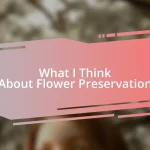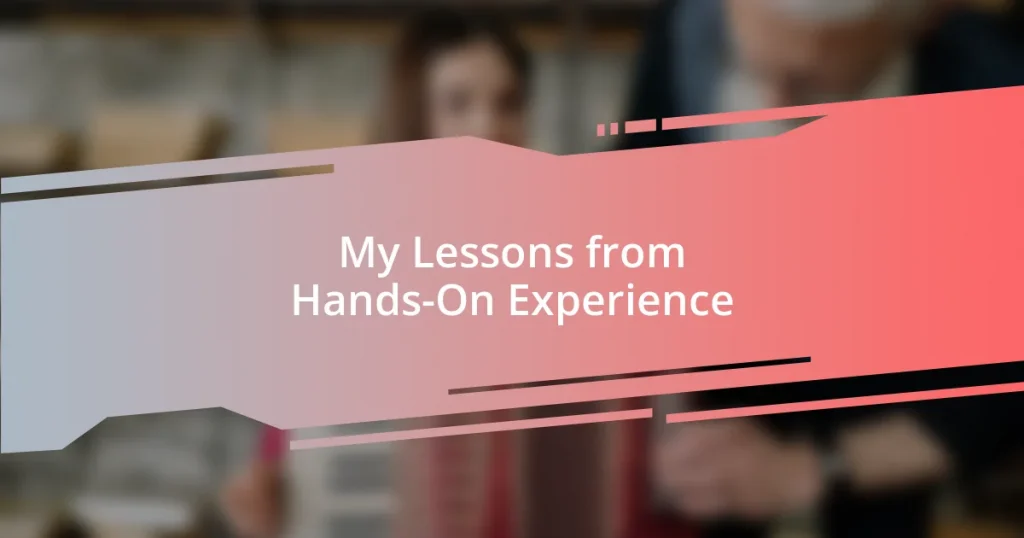Key takeaways:
- Hands-on experience enhances understanding and confidence by actively engaging with the learning process, making lessons more tangible and memorable.
- Practical learning fosters essential skills such as problem-solving, adaptability, and collaboration, which are critical for real-world challenges.
- Building confidence through practice not only empowers individuals but also cultivates a sense of community, reinforcing the idea that collective learning enhances personal growth.
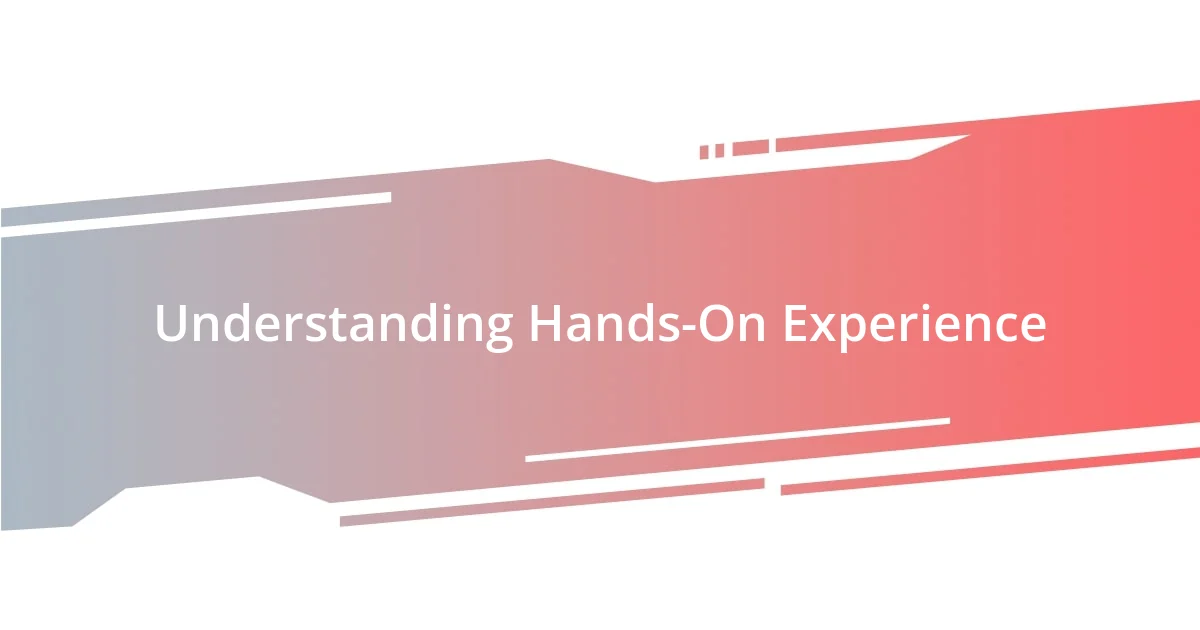
Understanding Hands-On Experience
Hands-on experience is more than just doing a task; it’s about immersing yourself in the learning process. I still remember the first time I fixed a flat tire on my bike. The sense of accomplishment I felt wasn’t just from completing the task but from really understanding how the mechanics worked—a lesson that goes beyond theory.
When I think about hands-on experiences, I can’t help but recall my time volunteering at a community garden. Getting my hands dirty taught me patience and the importance of nurturing something over time. It made me wonder, how often do we underestimate the value of physical engagement in our learning? The lessons I learned in that garden helped me grasp concepts that textbooks couldn’t convey.
There’s an undeniable connection between hands-on experience and confidence-building. After participating in a workshop where I built a piece of furniture from scratch, I walked away not only with a new skill but with a newfound belief in my abilities. Isn’t it fascinating how tackling a practical challenge can shift our mindset and encourage us to take on bigger obstacles in life?
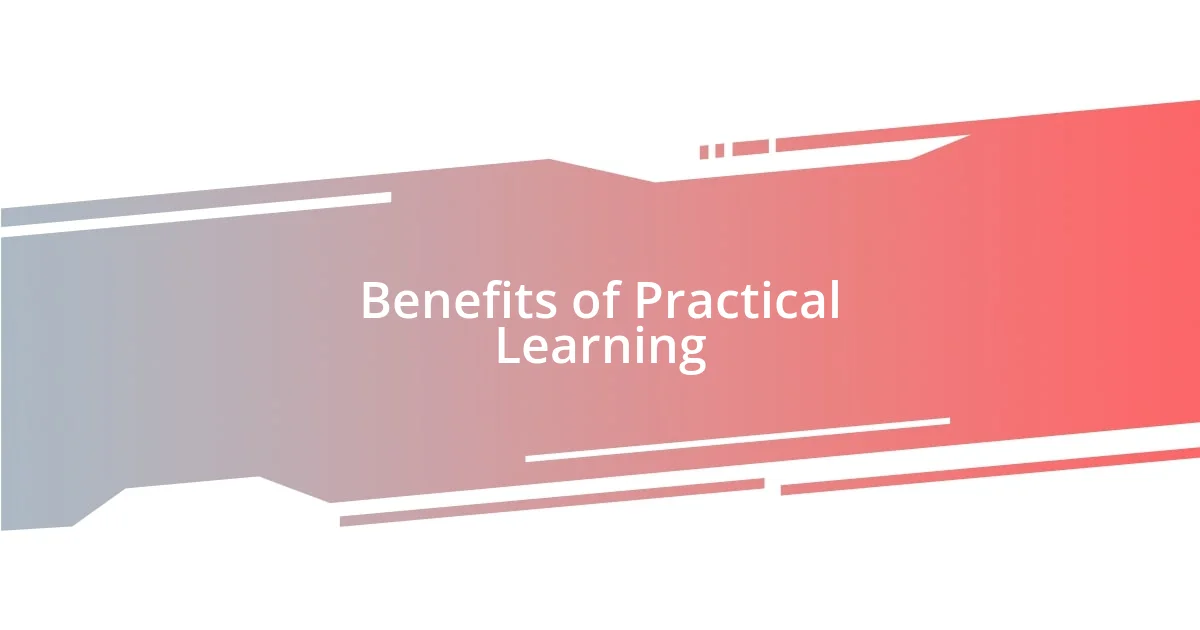
Benefits of Practical Learning
Practical learning offers a deeper understanding of concepts because it engages multiple senses. I remember my first cooking class where I tried to make a soufflé. Reading the recipe was one thing; however, feeling the texture of the ingredients and seeing them transform in the oven sparked a genuine interest in culinary science. This kind of learning not only makes knowledge stick but also transforms it into something tangible.
Another significant benefit is the development of problem-solving skills. When I worked on a DIY home project, I encountered unexpected challenges—like mismeasuring a cut for a shelf. Instead of feeling frustrated, I learned to adapt and think critically. This hands-on problem-solving experience is invaluable; it teaches resilience and equips us with the tools to face real-world scenarios.
Moreover, practical learning fosters collaboration and communication. During a group project where we built a small robot, I realized how vital teamwork is. We had to share ideas, listen, and compromise to succeed. This collaboration was not just about achieving a project goal; it was about learning to work with different perspectives, something I believe prepares us for future professional environments.
| Benefit | Description |
|---|---|
| Deeper Understanding | Engagement of multiple senses enhances retention and comprehension. |
| Problem-Solving Skills | Hands-on challenges develop resilience and critical thinking. |
| Collaboration | Learning in groups cultivates communication and teamwork skills. |
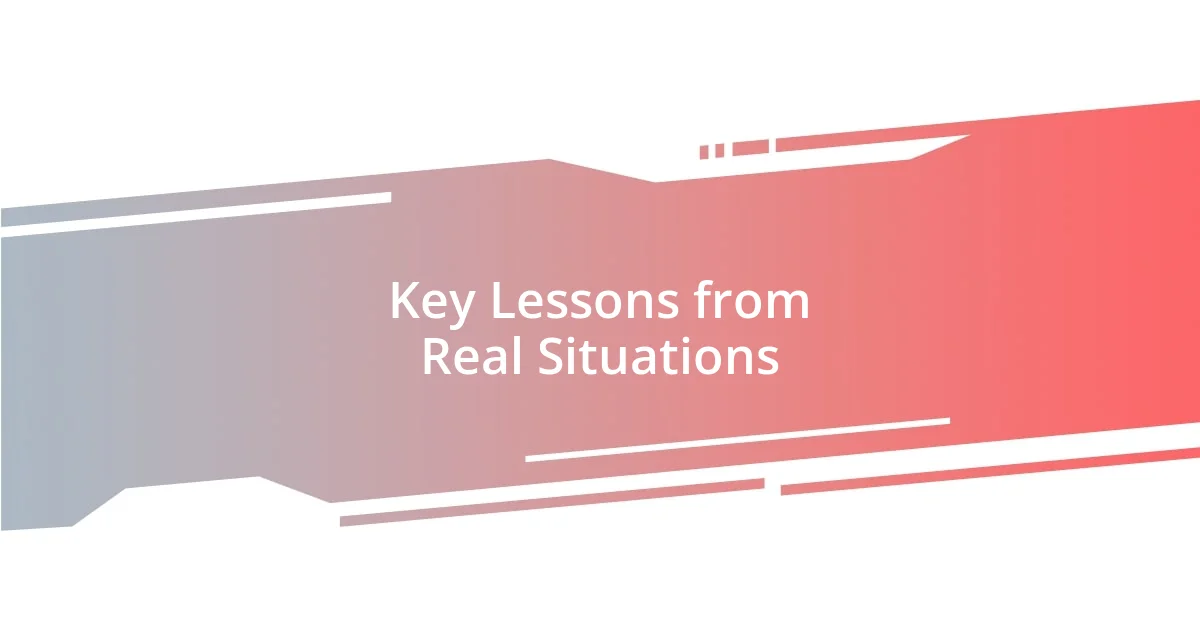
Key Lessons from Real Situations
One of the most insightful lessons I’ve learned from real situations is the importance of adaptability. When I participated in a volunteer project to refurbish an old playground, the weather turned unexpectedly foul on the day of our plans. Instead of grumbling about the rain, we quickly shifted our focus indoors, brainstorming new ways to engage the community through art projects related to the playground. This taught me that flexibility is crucial; sometimes, life’s hurdles can lead to even more rewarding outcomes than what you initially envisioned.
- Embrace Change: Being open to shifting your plans can lead to unexpected and valuable experiences.
- Collaboration is Key: Teamwork can spark creativity, especially when faced with challenges.
- Celebrate Small Wins: Every step you take, no matter how small, is a victory in itself.
Another key takeaway I’ve experienced is that patience often pays off. I vividly remember working alongside a mentor to learn woodworking. My first attempts at sanding and shaping wood were far from perfect. There were moments of frustration, but my mentor gently reminded me that mastery comes with time. In the end, my patience led to a beautiful, handcrafted piece that I still cherish. It’s a reminder that the journey matters just as much as the final product.
- Skill Development Takes Time: Embrace the learning curve instead of rushing through it.
- Value Persistence: Sticking with something difficult often leads to the greatest rewards.
- Build Relationships: Engage with those who can guide you through the process; their support is invaluable.
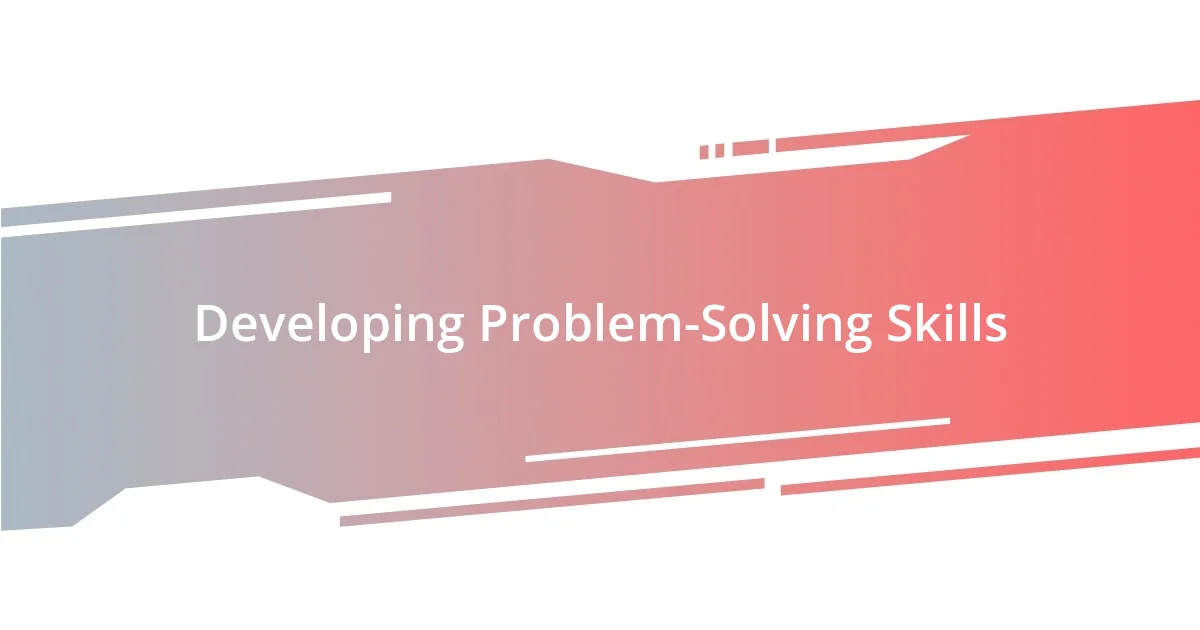
Developing Problem-Solving Skills
When I think about developing problem-solving skills, I can’t help but recall that time I attempted to fix my leaky faucet. I had watched countless online tutorials, feeling confident, yet when I confronted the mess beneath my sink, panic set in. But instead of retreating, I took a deep breath and tackled the problem bit by bit, which led me to understand the mechanics of plumbing in a way I never anticipated. Isn’t it fascinating how tackling real problems can lead to such unexpected learning?
Working through challenges hands-on cultivates creativity. I was once part of a community garden initiative. One weekend, the plants weren’t thriving as we expected, and rather than giving up, we brainstormed various solutions: adjusting sunlight exposure, altering watering schedules, or even changing the soil mixture. Our discussions sparked innovative ideas, like companion planting, which not only resolved our immediate issues but deepened my appreciation for gardening. Have you ever found that a problem has pushed you to think outside the box?
Ultimately, each problem I’ve faced in real-life situations has reinforced my belief in the power of resilience. I recall trying to assemble a piece of furniture without instructions—what a disaster! After several failed attempts and a bit of stubbornness, I decided to take it apart and start over, this time approaching it methodically. That experience taught me that it’s okay to stumble; what matters is how we rise from those falls. Problems often become our best teachers, don’t you think?
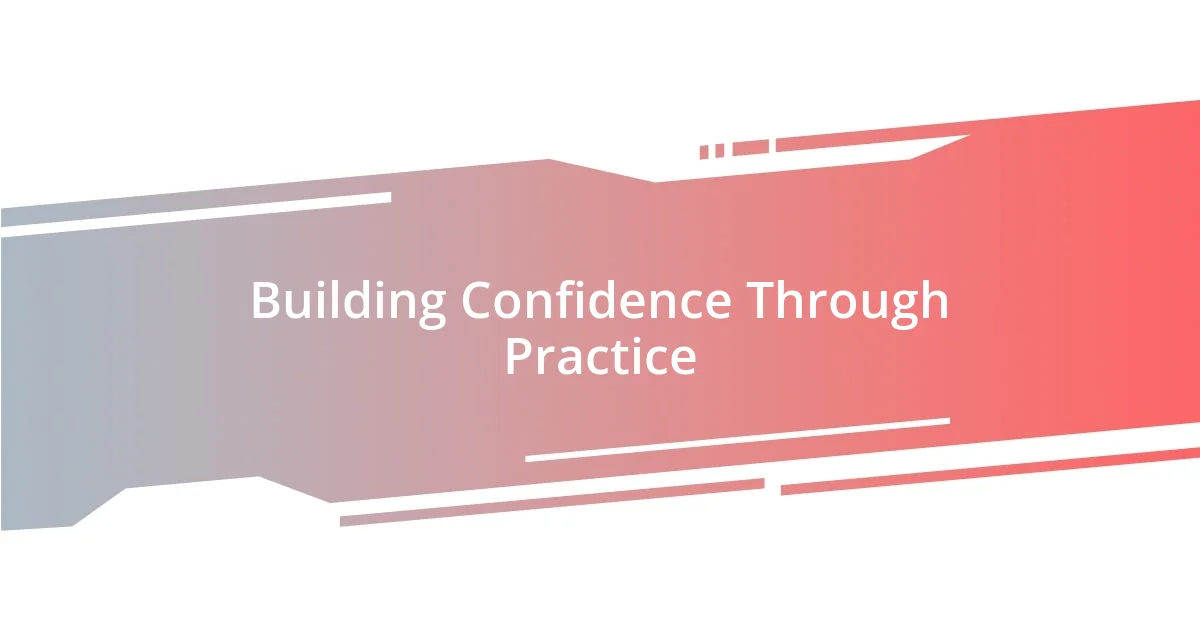
Building Confidence Through Practice
Building confidence through practice has been a game changer for me in various situations. I remember learning how to juggle, something I had always wanted to master. At first, it felt utterly frustrating; the balls seemed to have a mind of their own. But with each failed attempt, I could feel my confidence growing—each drop was a lesson, not a setback. Isn’t it interesting how practice can turn embarrassment into empowerment?
As I delved deeper into public speaking, I found that rehearsing in front of a mirror helped me refine my delivery. The first few times were awkward and cringeworthy, yet over time, I began to recognize my voice and style. I felt more at ease with the material, and each practice session transformed my anxiety into excitement. Have you ever noticed how familiarizing yourself with any skill alters your perception of it?
Most importantly, I realized that building confidence through practice also fosters a sense of community. Joining a local pottery class, I was surrounded by both novices and seasoned artists. As we made mistakes together—like accidental glazing errors or uneven shapes—I felt a camaraderie that made the experience less daunting. Sharing those moments helped me appreciate the journey, reinforcing the idea that confidence isn’t just about individual success; it’s also about learning together. What a beautiful realization, wouldn’t you agree?
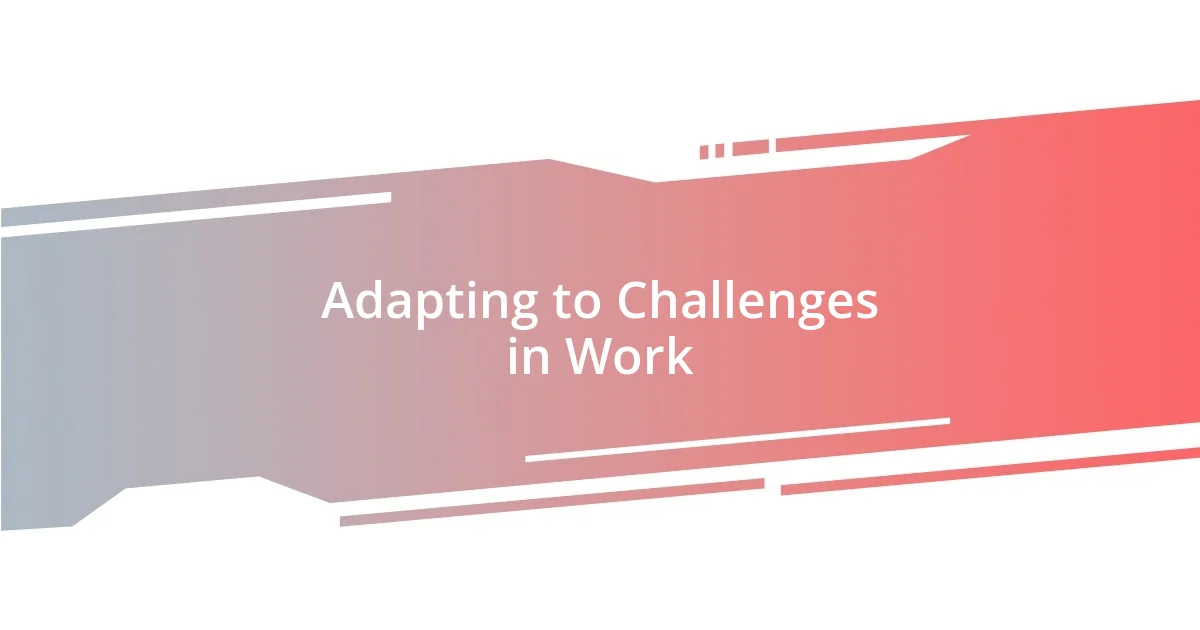
Adapting to Challenges in Work
Adapting to challenges in work is often an intricate dance that requires both flexibility and creativity. I remember when I was tasked with leading a project but found out one of my key team members was unexpectedly unavailable. Instead of seeing this as a setback, I quickly convened a brainstorming session with the rest of the team. It was eye-opening to realize how diverse perspectives can lead to innovative solutions that I hadn’t even considered. Have you ever found that collaboration can turn a potential crisis into an opportunity for growth?
There was another time when I was thrown into a new software platform that the company was implementing, and, quite frankly, I felt overwhelmed. Instead of panicking, I decided to take charge of my learning by setting up a personal schedule dedicated to mastering the system. I found that breaking the process down into smaller, manageable chunks not only made it less daunting but also empowered me to assist my teammates who were struggling. Isn’t it fascinating how taking proactive steps can bolster your confidence and competence?
I’ve faced moments where change was a constant, like during a major restructuring in my department. Initially, it felt unsettling and chaotic, but I chose to view it as an adventure. I started reaching out to colleagues in different areas of the organization to learn about their roles and how they adapted. This not only expanded my network but revealed incredible strategies others employed to thrive amidst uncertainty. In those instances, I realized that adaptability doesn’t just help us survive change; it can lead us to exciting new paths we may not have explored otherwise. Don’t you agree that embracing change often uncovers hidden opportunities?
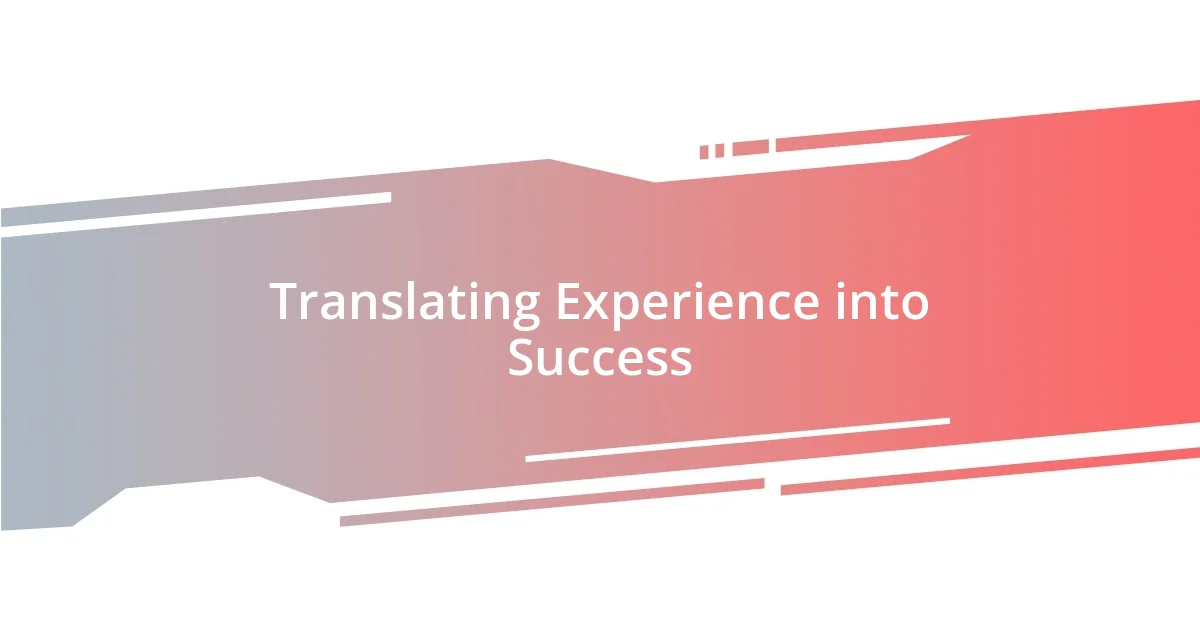
Translating Experience into Success
Translating experience into success often feels like piecing together a puzzle, where each experience serves as a vital piece. When I first started my small online business, I faced countless hurdles. One day, I woke up to find that my website had crashed overnight. Rather than panic, I dove into troubleshooting. That whole process transformed my frustration into a valuable lesson on crisis management. Have you ever noticed how unexpected challenges can become stepping stones if we approach them with a solution-oriented mindset?
One of the most profound lessons I’ve learned is that each experience carries wisdom, especially in moments of failure. I vividly remember my first presentation to clients; it did not go well at all. My nerves got the better of me, and I fumbled through the slides, missing key points. Instead of letting that embarrassment define me, I sought feedback from my peers and practiced again. The next presentation was night and day. Isn’t it amazing how leveraging feedback can pivot our experiences from awkward to successful?
At times, it’s the small victories that build a foundation for greater success. I joined a community group focused on financial literacy, where we shared our personal stories and struggles. One evening, I shared my fear of budgeting. To my surprise, others opened up about their own financial blunders, creating a shared bond. That not only made budgeting feel less intimidating but helped me gain practical tips from those experiences. Have you ever found that opening up about your challenges can foster deeper connections and lead to unexpected insights?



